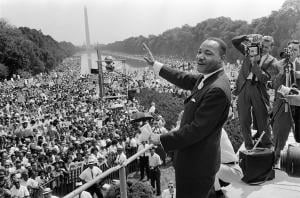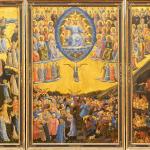
Dorothy Day once said she hoped she would not become a canonized saint because she feared when that happened, her message, and the work which she promoted, would be subverted by the process of canonization. She believed that a hagiographical portrait of her would be made which would ignore much of what she said and promoted, so that ultimately it can be ignored or dismissed. I think her fears have been proven to be true, as now I see many, who otherwise would have nothing to do with her before, want to make her one of their own, hoping to portray themselves and their work as continuing what she started. They want people to associate her holiness with what they are doing, but in the end, all they are doing is dismissing what made her holy, hindering others from following the path which she set up. I think no greater example of this can be seen than in the way I have seen right-wing ideologues and libertarians try to claim her as one of their own, using her to promote ideologies which she rejected, indeed, sometimes using her to promote the worst kind of Americanism, if not actually to encourage people to vote for and support authoritarian figures like Donald Trump. To be other, there have been many others who have properly picked up and properly continued her work, they seem to be more in the margins, and far less known than those who have forced themselves upon her legacy.
Dorothy Day knew what could and would likely happen, because she has seen how it happened to others who came before her. I would say it is what we have seen happen to the legacy of Martin Luther King Jr., whose works for civil rights, and a desire for a society which has removed all forms of racism, including systemic racism, has been turned into a message of saying we are all already equal. Indeed, many try to abuse his words to suggest anyone concerned about racism are those who are racists, because they see differences between people in a way Martin Luther King Jr. said should vanish. That is, by the way Martin Luther King Jr. has been honored by civil society, white supremacists have been able to dismantle his message, turn it into one little quip, and to then to use that quip as a way to promote their own ends, that is, to keep their privilege in society. Many, if not most, of the people who have created and honor this false portrait of Martin Luther King Jr. are the same people who say Christians should not be political, that is, should not address the president and tell him to be merciful and honor human dignity. They constantly try to find ways to deny Christians the chance to work for justice. The absurdity of this is revealed in the way Martin Luther King Jr., while he was alive, was told the same thing: he was told he should not be so political, indeed, that he was promoting racism, a hatred for whites, due to his work to overturn systemic racism. Now that he is dead, they hope they can control the message, and have people forget their hostility to his work
Martin Luther King Jr certainly wanted society to transcend the need for racial justice, but he also understood we were not there, nor even close to having attaining his dream. He had a dream, but he knew that it took action for the dream to be realized. He was hated by many because he kept telling society that it must change, that work must be done to dismantle systemic racism. He said more needed to be done than remove racist laws; he made it clear those who were adversely affected by racism would need to be helped, which meant, reparations had to be considered. He wanted a society where the color of one’s skin would not be taken into consideration, Those who like to echo his words without understanding that he saw it as something which needed to be achieved, trying to act like removing a few racist laws solved all the problems, impede the realization of his dream. Society has not yet overcome the effects of racial injustice, indeed, as we the Trump administration undermining the work of civil rights, we see the structures of racism are not only being put back in place, but risk being worse than before. We need to hear and see the words of the real Martin Luther King Jr., and engage them, now more than ever, if we are to confront head on white supremacy and the way it has taken over key positions of power.
Martin Luther King Jr speaks to all of us when he says we need to embrace civil disobedience when we find ourselves having to deal with threats to the common good, especially when we find those threats seek to remove basic rules and regulations which have been put into place to protect the dignity and needs of the poor, the needy, and the oppressed. Many who have yet to understand the way systemic injustice grows when it is not resisted will find that their livelihood will be next, if they do not join in and defend the innocents attacked today. When someone finally sees what is going on and the need to resist the powers that be, often because it finally affected them in some fashion, they must also acknowledge that there are others who have gone before them, others who they need to learn from and follow instead of trying to take over the resistance and act like they are the ones everyone was waiting for to lead them to victory. That is, as James Cone said, they need to be willing to take a back seat and humbly learn what they still need to learn. They can and should add their voice and work with the rest of the movement, but only to show their solidarity with the movement, and not as a way to try to take charge. They should listen to those like Martin Luther King Jr. who came before them, acknowledging, with Martin Luther King Jr., that as the laws continue to be unjust, not only do they hold no authority, they must be actively resisted, not because people should favor a lawless state, but because they should seek justice and laws which promote justice. This is especially highlighted in his Letter from Birmingham Jail (1963):
You express a great deal of anxiety over our willingness to break laws. This is certainly a legitimate concern. Since we so diligently urge people to obey the Supreme Court’s decision of 1954 outlawing segregation in the public schools, at first glance it may seem rather paradoxical for us consciously to break laws. One may well ask: “How can you advocate breaking some laws and obeying others?” The answer lies in the fact that there are two types of laws: just and unjust. I would be the first to advocate obeying just laws. One has not only a legal but a moral responsibility to obey just laws. Conversely, one has a moral responsibility to disobey unjust laws. I would agree with St. Augustine that “an unjust law is no law at all.”
Martin Luther King Jr. shows his activism is a Christian activism, though it is also one which works with and engages the moral concerns of others. While he did not want people think they had to be a Christian to join with him in the promotion of social justice, he felt it important to make sure his fellow Christians understood that Christian principles should lead them to resist unjust laws when they were promulgated and enforced:
Now, what is the difference between the two? How does one determine whether a law is just or unjust? A just law is a man made code that squares with the moral law or the law of God. An unjust law is a code that is out of harmony with the moral law. To put it in the terms of St. Thomas Aquinas: An unjust law is a human law that is not rooted in eternal law and natural law. Any law that uplifts human personality is just. Any law that degrades human personality is unjust. All segregation statutes are unjust because segregation distorts the soul and damages the personality. It gives the segregator a false sense of superiority and the segregated a false sense of inferiority. Segregation, to use the terminology of the Jewish philosopher Martin Buber, substitutes an “I it” relationship for an “I thou” relationship and ends up relegating persons to the status of things. Hence segregation is not only politically, economically and sociologically unsound, it is morally wrong and sinful. Paul Tillich has said that sin is separation. Is not segregation an existential expression of man’s tragic separation, his awful estrangement, his terrible sinfulness? Thus it is that I can urge men to obey the 1954 decision of the Supreme Court, for it is morally right; and I can urge them to disobey segregation ordinances, for they are morally wrong.
Christians and non-Christians alike must heed these words and confront the growing injustices which are before them today. Trump and Vance, in their actions, reveal their denial of the dignity of the human person; they follow the advice of those who call a great number of the poor and needy, those of poor health, or old, to be parasites who should be exterminated. The same people whom Christ promoted and affirmed are the ones Trump, Vance, and their ideological partners, are attacking (and once their dignity has been lost, it is easy to justify all kinds of abuse, even their execution, as history has shown many times before). Christians need to see the denial of human dignity going on, even as they should see this attack on human dignity is also an attack on Christ himself. The poor, the elderly, those of bad health, and the like are not parasites to be killed off; they are those whom society is meant to look after and help, showing them the love and care they need. When politicians and their ideologies deny the dignity and human worth of anyone, Christians must show who they will stand with. Will they stand with Christ and his preferential option for the poor, or the rich elites and their preferential option for the rich which requires undermining the poor? As they answer this, Christians will find there is no way to avoid being political. Their answer will affect politics and what happens in the political landscape. But, as Martin Luther King Jr. pointed out, God has always expected people to confront those in positions of power and authority, to be political, when the leaders of nations engage grave injustices:
Of course, there is nothing new about this kind of civil disobedience. It was evidenced sublimely in the refusal of Shadrach, Meshach and Abednego to obey the laws of Nebuchadnezzar, on the ground that a higher moral law was at stake. It was practiced superbly by the early Christians, who were willing to face hungry lions and the excruciating pain of chopping blocks rather than submit to certain unjust laws of the Roman Empire. To a degree, academic freedom is a reality today because Socrates practiced civil disobedience. In our own nation, the Boston Tea Party represented a massive act of civil disobedience.
I cannot stress this enough. No matter how many times people have told them otherwise, the truth of the matter is that Christians must be political. They must not get political in the sense of integralism suggests, taking over and controlling the world, falling for a temptation of the devil. But they must not fall for the opposite error, thinking they can abandon the world. They must deal with the widespread attack on the dignity of the human person. They must fight against the brutality and malice of those who are in position of power. They must join themselves with non-Christians who, likewise, work for and promote human dignity and the way society should work for the common good, helping those in need. Martin Luther King Jr.’s exhortations must be heeded; Dorothy Day must be heeded; other revolutionaries, like St. Oscar Romero must be heeded. We must remember what made so many Christians holy is in the way they worked for and promoted human dignity, and indeed, in the way they confronted the powers that be, making them hated in their time for it. We must not do them an injustice by softening their message, especially as what they said is especially needed to be heeded today. And, if Christians find their fellow Christians standing against them and the promotion of justice, while finding non-Christians, like Jews, Muslims, Buddhists, and even atheists standing with them in its promotion, then, I think it is clear, they should stand in solidarity with those working for truth and justice and not those who claim to be Christian but who do and promote ideologies which stand against Christ’s teachings. Indeed, we should realize, those who work for and promote truth and justice will be recognized by Christ for what they have done, as Christ will say they have done it for him, while those who stand against such justice, doing so in the Lord’s name, will find they have used the Lord’s name in vain and they will suffer the consequences of their blasphemous attempt to invoke Christ in the way they have denied the dignity of all.
* This Is Part XLIV Of My Personal Reflections And Speculations Series
Stay in touch! Like A Little Bit of Nothing on Facebook.
If you liked what you read, please consider sharing it with your friends and family!
N.B.: While I read comments to moderate them, I rarely respond to them. If I don’t respond to your comment directly, don’t assume I am unthankful for it. I appreciate it. But I want readers to feel free to ask questions, and hopefully, dialogue with each other. I have shared what I wanted to say, though some responses will get a brief reply by me, or, if I find it interesting and something I can engage fully, as the foundation for another post. I have had many posts inspired or improved upon thanks to my readers.
















